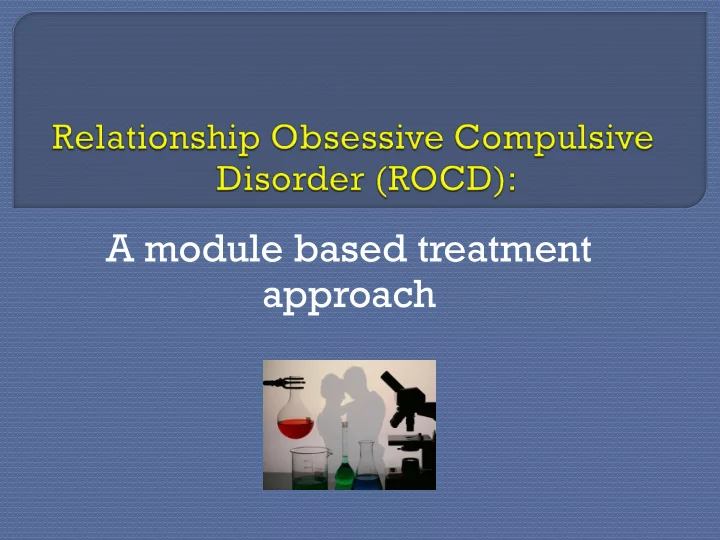

A module based treatment approach
Heterogeneous Intimate relationship are important OCD and intimate relationships • Functioning, marital distress, less likely to get married OCD symptoms impair relationship quality
• Clients • More complex than OCD • No Studies • No documented solutions
Relationship-related obsessive-compulsive symptoms
IT consultant, lives with partner 3 years in relationship • (12 months living together)
Relationship-Related OC Symptoms Partner’s flaws Centering on the relationship itself • My feelings (Appearance, morality, etc.,) •Partner’s feelings •“Rightness” of relationship Relationship-centered Partner-focused OC symptoms OC symptoms
Obsessive form “pop into head” Egodystonic • values and experience Unwanted Associated with neutralizing behaviors Significant distress/Impair functioning
Answer criteria of OCD • Obsessions intrusive thoughts, images or urges the person attempts to neutralize and recognizes as a product of their own mind not excessive worries about life problems • Compulsions compulsive reassurance seeking ( e.g.,“sanity checks”) checking (e.g., monitoring of emotions) comparing (e.g., looks, feelings in past relationships) Causes significant distress and dysfunction
Relationship-Related OC Symptoms Partner’s flaws Centering on the relationship itself • My feelings (Appearance, morality, etc.,) •Partner’s feelings •“Rightness” of relationship Relationship-centered Partner-focused OC symptoms OC symptoms ROCI PROCSI
12 items • Feelings towards one’s partner ( α =.84) I feel that I must remind myself over and over again why I love my partner • The "rightness" of the relationship ( α =.89) I constantly doubt my relationship • Partner's feelings ( α =.87) I find it difficult to dismiss doubts regarding my partner's love for me
24 items • Partner's perceived in six domains When I am with my partner I find it hard to ignore her physical flaws I am troubled by thoughts about my partner's social skills I am constantly bothered by doubts about my partner's morality level
Domain specific Self-vulnerability (relationships) Domain Response specific (compulsive triggers monitoring of (dinner with own emotions) partner) Insecure Attachment Strategie s Appraisal Intrusion (maybe I don’t (I am bored) love my partner) OCD – beliefs Catastrophic relational beliefs
Domain specific Self- vulnerability Domain specific Response triggers Attachment Strategies Appraisal Intrusion OCD – beliefs Catastrophic relational beliefs
Self Structure Personality Characteristics Narcissistic tendencies Contingency on relationship domain OCPD Contingency on partner value Attachment Insecurities Sensitivity in relationship domain Self Vulnerability
Personality Domain specific Increased Attention (inwards Self Structure and/or outwards) Self- vulnerability Contextual Domain Interaction with partner specific Response Romantic cues triggers Emotional States Boredom Anger Attachment Anxiety Strategies Appraisal Intrusion OCD – beliefs Catastrophic relational beliefs
Relationship Beliefs Obsessive Beliefs “if I leave, I will hurt my partner“ “if not perfect it is worthless” “regret is unbearable“ “having a thought means it is important” "you should only marry once“ “harmful events will happen unless I’m “leaving my partner careful” will have disastrous Intrusion personal and social “I am bored” consequences” Catastrophic Appraisal “Maybe I don’t love him/her, I have to leave” “I have to make sure I love my partner” “I will regret this forever”
Personality Domain specific Increased Attention (inwards Self Structure and/or outwards Self- vulnerability Contextual Interaction with partner Domain Romantic cues Response specific triggers Emotional States Boredom Anger Insecure Attachment Anxiety Strategies OCD-related beliefs Appraisal Intrusion Relationship beliefs
Response Insecure Attachment Strategies Catastrophic Appraisal
Catastrophic Appraisal Insecure Attachment Strategies Response
Catastrophic Emotional regulation Appraisal attempts Insecure Attachment Exacerbation of Strategies distress Emotional responses Anxiety Guilt Shame Response Jealousy Cognitive-Behavioral responses Reassurance(self/others) Monitoring (feelings/behaviors) Comparisons
Personality Domain specific Self Structure Self- vulnerability Self criticism Emotional responses Domain Conditioning Response specific Cognitive- triggers Behavioral responses prevents refuting Attachment Strategies OCD- related beliefs Appraisal Intrusion Relationship beliefs reinforcing relationship doubts
Emotional ROCD responses ROCD Cognitive- responses Responses Behavioral responses Commitment
Rusbult Investment Model Investment Commitment Alternatives Satisfaction
Rusbult Investment Model Investment ROCD Commitment Alternatives Satisfaction
Investmen t ROCD Commitment Alternative Satisfaction s
ROCD responses Commitment
Domain specific Self-vulnerability (relationships) Domain Response specific (compulsive triggers monitoring of (dinner with own emotions) ROCD partner) Insecure Attachment Commitment Strategie s Appraisal Intrusion (maybe I don’t (I am bored) love my partner) OCD – beliefs Catastrophic relational beliefs
Development
Predisposing general vulnerabilities (biological/psychological) Insecure Self attachment Schemas vulnerabilities representations May be latent Maladaptive Relationship Assumptions beliefs and OCD-related biases beliefs Triggering event NATs Negative relationship appraisals Symptoms Cognitive, behavioral, emotional, physiological
Early experiences Parenting Parenting models (parental conflict, idealized parents) Criticism Preoccupation with relationships Conditional parenting in specific domain Overprotective parenting
ROCD/OCD • Correlated but distinct Depression Relationship/sexual satisfaction General worry Processes • Self vulnerabilities • Attachment and emotional regulation Maladaptive relationship biases
Recommend
More recommend